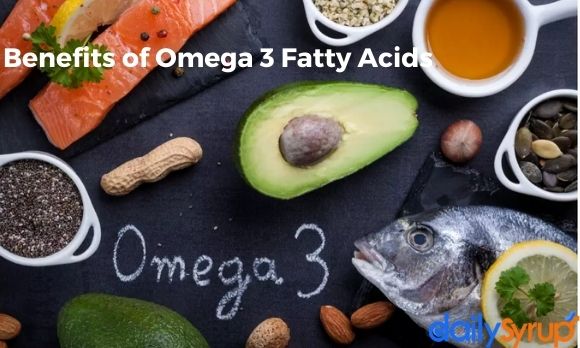Omega-3 fatty acids are essential fatty acids that the body can’t produce on its own. Everyone should get them from diet however very few people know about it. In this article, we will tell you about the benefits of Omega-3 Fatty acids. Also about the effects of its deficiency and side effects. Before we start let’s find some more details about omega-3 fatty acids.
Types of Omega-3
Omega-3 fatty acids are mainly of three types
- ALA (alpha-linolenic acid)
- DHA (docosahexaanoic acid)
- EPA (ecosapentoinic acid)
Source
- ALA is found in walnuts, chia seeds, flax seed, flaxseed oil, soybeans and hemp seeds. Human Body mainly uses it for energy.
- DHA is the most important of all the three. It is the most important component of the retina, brain and many other body parts. Main sources for DHA are eggs, meat, fish oil etc. Vegans often lack it.
- EPA are mainly found in fish oil, algae etc.
Benefits of Omega-3 Fatty Acid
Pregnancy
Omega-3 supports the development and brain growth in infants. Polyunsaturated fatty acids in the brain have around 40% of DHA while the retina has 60%.
Omega-3 is linked to intelligence. It also decreases the risk of autism and cerebral palsy etc.
Read- Home Remedies for cholesterol
Heart
Lakhs of people suffer from heart diseases which is also a major cause of death. Research proves that people having fish foods had less rate of heart diseases. Omega 3 reduces triglyceride which ranges from 15 to 30 percent.
It raises good cholesterol and lowers blood pressure. It keeps the arteries smooth and doesn’t let them harden. However, more evidence is needed for its efficiency.
Also Read- 7 Best Foods for Digestion
Obesity
Omega 3 works on metabolic syndrome which includes central obesity also called belly fat.
Eyes
DHA constitutes as a major structural component of your retina. Its deficiency leads to vision problems. It also reduces risk of macular degeneration.
Skin
Omega-3 fatty acids are beneficial for the skin. It keeps the skin soft, moist and free from wrinkles. Prevents skin dehydration and skin damage caused by sun rays.
Related: Omega 3 Fatty Acid Supplements Fish Oil
Depression
One of the most common mental disorders having symptoms like loss of interest in life and sadness etc. The study says people who take Omega 3 daily have less chances of getting it. EPA is considered to be the best in fighting depression.
Check: Free Counselling in India
Omega-3 Fatty Acid Dosage
There is no official dosage of Omega fatty-3 fatty acids. Health org’s agree to recommend around 250-500 mg of EPA and DHA combined. It is enough for adults as a maintenance dosage.
At the same time, there are different dosage recommendations for different diseases.
Side Effects of Omega-3 Fatty Acid
- Nausea
- Vomiting
- Abdominal pain.
- Excess intake may cause bleeding problems, flatulence, increase in blood pressure.
Once you think about taking omega-3 fatty acids, consult your doctor strictly.
Tell us what you want to read about. Do share this post if you like it.
The content is not an alternative to medical consultation. Meant for general information only.
FAQ Omega 3 Fatty Acids
What are the omega-3 fatty acids benefits?
Reduced risk of cardiovascular disease. Reduced risk of death if you have cardiovascular disease. Reduced risk of sudden cardiac death caused by an abnormal heart rhythm. Reduced risk of blood clots because omega-3 fatty acids help prevent blood platelets from clumping together
Which are some of the best Omega-3 fatty acid supplements?
Best Omega 3 fatty acid supplements are omega 3 fish oils or syrup
What are some omega-3 fatty acids foods ?
Some of the best foods for omega-3 fatty acids are Mackerel (4,107 mg per serving), Salmon (4,123 mg per serving), Cod liver oil (2,682 mg per serving), Herring (946 mg per serving), Oysters (370 mg per serving), Sardines (2,205 mg per serving), Anchovies (951 mg per serving), Caviar (1,086 mg per serving)
Which are the best Omega-3 fatty acids sources?
Fish and other seafood (especially cold-water fatty fish, such as salmon, mackerel, tuna, herring, and sardines)
Nuts and seeds (such as flaxseed, chia seeds, and walnuts)
Plant oils (such as flaxseed oil, soybean oil, and canola oil) Sources of Omega 3 fatty acids
Is Omega-3 good for men?
Various Findings show omega-3 fatty acids may help to, Lower blood pressure. Reduce triglycerides. Slow the development of plaque in the arteries. Reduce the chance of abnormal heart rhythm. Reduce the likelihood of heart attack and stroke. Lessen the chance of sudden cardiac death in people with heart disease.

